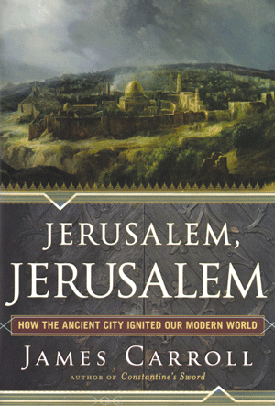Reviewed by NEAL GENDLER
James Carroll’s new book is about two Jerusalems — one of streets and walls, one of longing and imagination — but that doesn’t scratch the surface of this compact yet enormous work.
In 317 pages, Jerusalem, Jerusalem explains the development, purpose and history of religion; the growth of Judaism, Christianity and Islam and the disagreements among them; religion’s shaping of Western civilization; the misinterpretations creating Christian hatred of Jews; how each religion’s loss of Jerusalem increased its longing for it; and how all those matters created conflicts that continue.
The result is a fascinating and rare combination of scholarship and reader accessibility. If Jerusalem, Jerusalem sometimes is slow going, it’s not because of Carroll’s writing — many a newspaper would envy such clarity — but because the weight of his information and ideas simply takes time to digest. His 62 pages of notes contain information as interesting as the text, and useful for Jews unfamiliar with the New Testament.

Carroll begins with a history of human development, from hunting to war, calling ritual sacrifice — particularly the “violence of scapegoating sacrifice” — a way to channel and assuage man’s urge to kill. But “God is the opposite of violence.” He says violence is the problem addressed by the Bible, which is the record of Jews’ rejection of violence.
Carroll, a former Catholic priest, is author of the acclaimed Constantine’s Sword, a 500-page indictment of Christian anti-Semitism, which he continues in this volume. He denounces the Christian idea that Jews’ loss of Jerusalem was God’s punishment for not accepting Jesus as messiah. “Jewish dispersal from Jerusalem was a corollary of [Christian] faith,” he says. “The holy city occupied the center of European maps — and imagination — for more than 1,000 years.… But the Jerusalem of this dream [was]… devoid of Jews.”
Muslims, too, considered the city holy — and naturally theirs. Carroll says Jews’ idea of Jerusalem as holy developed during Babylonian exile, and historically, the physical city has been coveted most by the religions that don’t control it.
The Jerusalem of the imagination has shaped much of Western thought for centuries — particularly fueling the American idea; Puritans saw their New World as the creation of a New Jerusalem. The idea has led to more than 20 Jerusalems, 61 Zions, and 127 Salems across the United States.
Britain also latched on. A William Blake poem set to music encouraged a population exhausted by World War I to fight on until “we have built Jerusalem in England’s green and pleasant land.”
After explaining the three religions’ investment in the concept of Jerusalem, Carroll turns to the earthly Jerusalem, laying the most-direct creation of today’s Jewish-Arab conflict at the feet of World War I-era Britain; it made vague promises of sovereignty to its Hejaz allies and also issued the Balfour Declaration. The author deals with the city’s capture in 1917, as a Christmas gift to the war-weary British public and then with the creation of Israel, including the notion of internationalizing Jerusalem. “Rejection of Jewish power over Jerusalem was imbedded in the DNA of Christendom, and therefore, by 1948, of Western civilization,” he says. One could argue that it remains so.
Carroll’s empathy for Jews and respect for Judaism is beyond challenge. But he seems in this last third of the book to be almost tormented, split between understanding and justifying Jews’ need for and right to Israel, while repeatedly criticizing its treatment of Palestinian Arabs. His notes often cite severe critics of Israel.
Very traditional Jews won’t like his suggestion that Jericho fell to a group of monotheistic Canaanites, perhaps assisted by a small group of Hebrews who’d come from Egypt — in effect, minimizing or negating the Exodus story. And indirectly, he dismisses the belief that God dictated the Torah to Moses at Sinai, referring to writers and editors of the Jewish Bible and the New Testament.
Serious thinkers may not buy all of Carroll’s ideas, but his monumental work demands they pay them serious attention.
***
Neal Gendler is a Minneapolis writer and editor.
(American Jewish World, 5.13.11)



















